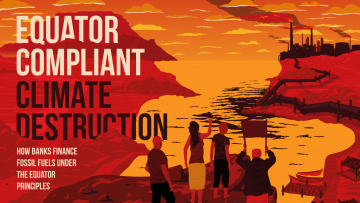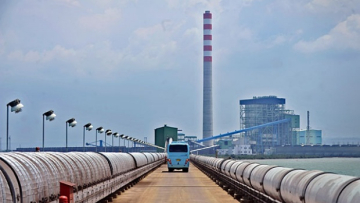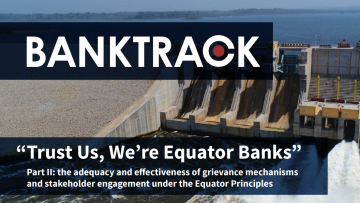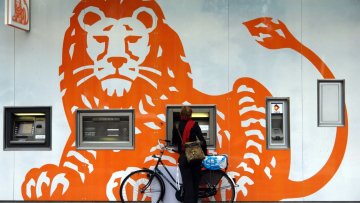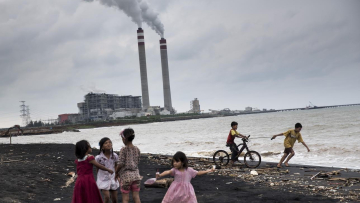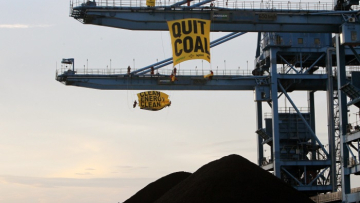Project – Active
This profile is actively maintained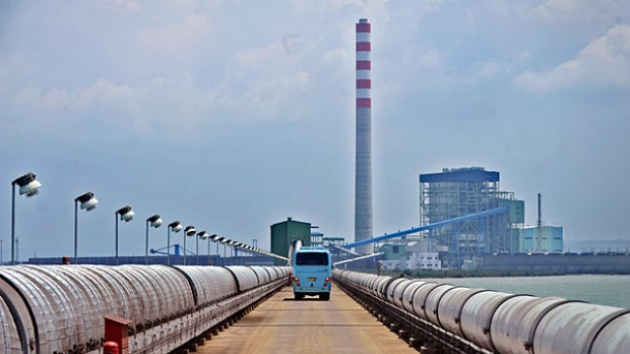
Project – Active
This profile is actively maintainedWhat must happen
Financial institutions should avoid financing the expansion of the Cirebon power plant, and the banks involved in the consortium financing Cirebon 2 should urgently withdraw their support. We consider ING’s involvement in this project a clear violation of the bank's new coal policy, adopted in November 2015 in the lead-up to COP21, which clearly states that "ING will not finance any new coal-fired power plants". Further, financing this project would present a breach of the Equator Principles.
| Sectors | Coal Electric Power Generation |
| Location |
|
| Status |
Planning
Design
Agreement
Construction
Operation
Closure
Decommission
|
| Website | http://www.cirebonpower.co.id/ |
|
|
This project has been identified as an Equator Project |
The coal fired power plant Cirebon Unit 2, with a capacity of 1,000 megawatt, is a power plant project in the West Java region of Cirebon, Indonesia. The project is estimated to require an investment of USD two billion and is expected to be operational in 2020. The Cirebon project was also supposed to include a further 1,000 megawatt expansion, Cirebon 3, expected to cost a further USD 2.1 billion. However, as of June 2020 there had been no progress on Unit 3 since May 2016 by Marubeni and other potential sponsors, and the unit appears to be cancelled. The project is being developed by Cirebon Energi Prasarana (CEPR), a consortium consisting of Marubeni (35%), Indika Energy (25%), Samtan (20%), Korea Midland Power (10%) and Chubu Electric (10%). This consortium signed a 25-year power purchase agreement with the Indonesian state power utility PLN in October 2015.
The Marubeni-led consortium has awarded Black & Veatch, a US-based global engineering company, the engineering contract. Black & Veatch will oversee the scheduling, design, quality control of equipment supplied and construction of the second expansion. ING Bank and Latham & Watkins, an international law firm, are advising on the project.
Impact on human rights and communities
Lack of Appropriate Consultation and Transparent Procedure in EIA and land acquisition
The Construction of Cirebon Unit 1 started before any environmental impact assessment (EIA) was completed, and local communities have complained of lack of transparency during the land acquisition process for the plant site. There are accounts of local authorities and companies using intimidation to encourage local landowners to sell their land, and a similar situation is emerging in the process of EIA and the land acquisition for Cirebon Unit 2.
Health impacts of coal
Coal power plants are a significant source of air pollution, filling the air with toxic pollutants, including mercury, lead, arsenic, cadmium and tiny toxic particles that go deep into people's lungs. This pollution leads to an increased risk of lung cancer, stroke, heart diseases, and respiratory diseases. See the 2015 Greenpeace report 'The Human Cost of Coal Power', based on a Harvard University study.
Harvard University has found that existing coal-fired power plants in Indonesia cause an estimated 6,500 premature deaths every year. Each large new power plant, like the Cirebon 2 Expansion (1000 MW capacity) is expected to result, on average, in the death of 600 Indonesians every year.
There have been anecdotal reports from local residents from the surrounding area of the Cirebon Unit 1 Plant of increased respiratory infections, which matches the government data showing there are more patients affected by acute upper respiratory tract infection in this area than other districts.
Impacts on local livelihoods
Since the construction and operation of Cirebon Unit 1 Plant in 2007, the local community has suffered heavily from ongoing adverse environmental impacts of the plant. The people residing at villages near the plant have traditionally relied on small-scale fishing, shellfish harvesting, salt making, production of terasi (shrimp paste) and farming for their livelihood. These livelihoods are all but gone for the local residents due to Cirebon's pollution, use of water resources and impacts on the natural environment.
According to testimonies from local communities, fish and shrimp catches decreased by more than half since the beginning of the project in 2007. The productivity of salt pans near the project site has also deteriorated since Cirebon Unit 1 began its operations, and as a result community representatives report that some 500 laborers in the affected communities have lost their livelihood. These impacts have been reported by the community organisation Rapel (Rakyat Penyelamat Lingkungan, or Environment Defender Community) Cirebon.
Impact on climate
The Cirebon coal plant expansion will run for 25 years, processing approximately 3.2 million tonnes of coal per year. The expansion is totally out of line with the Paris Agreement, which requires coal to be phased out across the world by 2040. Nonetheless, Indonesia has become one of the world’s largest coal exporters, and coal continues to provide more than half of the country’s energy supply.
Climate Impacts
Indonesia is vulnerable to climate change, particularly extreme heat and sea-level rise. Indonesia has 80,000 kilometres of coastline and 17,500 islands, and much of the country’s population lives at low elevations along these coastal areas. As global temperatures rise, millions of people could be exposed to permanent flooding. Changes in seasonal rainfall, coupled with saltwater intrusion into low-lying areas, may reduce the amount of available potable water. The production of rice, one of Indonesia's staple crops, depends on the wet season, which may be delayed by up to a month as the climate changes. Palm oil and coffee production may drop, too, as agricultural areas become unsuitable for growth.
Impact on nature and environment
Water pollution
Coal is one of the most water-intensive methods of generating electricity since it consumes and pollutes a huge amount of water during extraction, processing, and combustion at power plants. An incredible amount of water is used and contaminated during the entire lifecycle of coal: coal mines deplete groundwater and pollute rivers and lakes. Coal washing turns large amounts of freshwater into toxic wastewater. Coal power plants consume vast amounts of water for cooling and pollution controls and their coal ash ponds can contaminate surrounding water bodies.
Coal ash pollution
Burning pulverized coal in boilers to create steam for power generation produces a number of combustion residuals. One is bottom ash, which is removed from the bottom of coal furnaces. Another is fly ash, most of which is captured by filtration equipment before flue gases reach the chimneys of power plants. Other combustion residuals are emitted through the stack. Such coal ash is generally trucked in dry or sent through pipelines with water to a disposal facility. The former generates fugitive dust and the latter often leads to groundwater contamination as heavy materials and other toxic chemicals flow into bodies of natural water. Coal ash is highly likely to contaminate soils, as well as harm ecosystems and human health, since it contains various heavy metals like arsenic, cadmium, chrome, cobalt, copper, lead, and mercury, as well as radioactive substances such as radium, thorium, and uranium.
Air pollution
Air pollution standards in Indonesia are not protecting the local population. Despite the enormous health impacts of particulate matter pollution, Indonesia has no air quality standards for PM2.5, no standards for yearly average PM10 levels, and only a very weak standard of 150μg/m3 for daily PM10 levels. There is almost no air quality monitoring in Indonesia. From everyday experience it is clear that air pollution is a serious issue e.g. on much of Java and Sumatra, but there is little hard data made available by the government.
The Cirebon region
In West Java province in Indonesia is already feeling the effects of climate change. These include a rise in sea level, flooding in the coastal area, and drought during the long dry season. According to the national Agency for Disaster management (BnPB), about 13 per cent of the total area in Cirebon city is at heightened risk from flooding during high tides and high rainfall periods. In addition, the impacts of climate change threaten agricultural production, with drought causing extensive crop failure, in particular in Cirebon district (source: pubs.iied.org).
The consortium of commercial banks, mandated in January 2016, provides 40% of the total debt of the project.
Credit Agricole withdrew from this consortium of banks at the end of March 2017.
Project sponsor
CEP
IndonesiaOther companies
Applicable norms and standards
Grote zorg over financiering omstreden kolencentrale in Indonesie door ING
Terangmu, Gelapku - Cirebon CoalFire
Disastrous Coal
Video links
2025
2025-08-26 00:00:00 | Prosecutors clear Hyundai for bribing Indonesian officials in relation to Cirebon plant
South Korean prosecutors cleared Hyundai Construction, in charge of the construction of the Cirebon-2 coal power plant, from allegations of bribing Indonesian officials. The Court found that the bribery did indeed take place, but that conviction could not be determined due to grounds for justification. When protests against the plant escalated into violence, an Indonesian official asked money to the company in exchange for quelling the protests. The company agreed, but the South Korean Court found that it was forced to do so to protect the security of its employees.
2025-03-04 00:00:00 | Cirebon-1 set to retire by 2035
The Indonesian Minister for Energy revealed that Cirebon-1, operational since 2012, is planned to be retired by 2035.
2024
2024-09-27 00:00:00 | Cirebon-2 operational since mid-September
An article concerning the appreciation by the Indonesian Ministry of Energy for Cirebon 2's handling of emissions within international standards revealed that the power plant had already been operational for a couple of months.
2021
2021-04-26 00:00:00 | Indonesian groups file formal complaint against ING for Cirebon II financing
On the day of ING's annual shareholders' meeting, the Indonesian Fair Finance Guide, Responsibank, is filing a formal complaint against ING. For years, international environmental and human rights organisations, including the Fair Finance Guide, have called on ING to stop financing the Cirebon coal power plant. But ING still provides USD 125 million in financing to Cirebon 2 and is lead arranger for a consortium of banks that collectively has provided USD 592 million to Cirebon 2. Read more here.
2020
2020-03-08 00:00:00 | Cirebon 2 development delayed
In March 2020 the project's sponsor declared force majeure and stated that development would be delayed as a result of the COVID-19 pandemic.
2019
2019-11-20 00:00:00 | Possible corruption and bribery in issuing environmental permit
The company building Cirebon 2 – Korean Hyundai Engineering and Construction – stands accused of bribery and corruption. On 15 November 2019, the Indonesian Corruption Eradication Commission (KPK) announced Hyundai’s general manager as a suspect in bribery of the former regent of Cirebon.
According to KPK, the former regent received 6 billion rupiah (approx US$423,000) to give the project the go-ahead. PT. Cirebon Energi Prasarana (CEPR), the project sponsor, is also implicated in these corruption allegations. KPK has imposed a six-month travel ban on both the CEO and CEPR’s director. If the project licensing is proven illegal, this project could be cancelled.
The original environmental permit for the plant was revoked on 19 April 2017. However the sponsors filed another permit in July, which was issued in September 2017. Bandung Legal Aid challenged that new permit and is having the legality of the verdict in this case reviewed. Loans have been disbursed despite this legal uncertainty.
2017
2017-11-20 00:00:00 | Indonesian environmental groups file notice against government on Cirebon2
2017-08-14 00:00:00 | Decision to revoke the environmental permit for Cirebon 2 seems final
The Head of West Java Provincial Investment and Licensing Agency (BPMPT West Java Province) being the defendant in a courtcase regarding the environmental permit for the Cirebon 2 power plant has revoked the appeal against the decision of the Bandung State Administrative Court. The request means that the government has to accept the first court decision to revoke the environmental permit. Wahyu Widianto, WALHI Advocacy Manager of West Java, expects the defendant to immediately comply with this decision: "This ruling shows the enforcement of one of the worst examples of the 35,000 MW project implementation, as legislation has been breached. With the BHT of this verdict we can see that this project, being contrary to the prevailing spatial plan, and clearly violates the law, has a high legal risk." (source Walhi.or.id).
2017-06-13 00:00:00 | WALHI has formally lodged its feedback to a request made by PT Cirebon Energi Prasarana
The West Java chapter of environmental organization Wahana Lingkungan Indonesia (WALHI) has formally lodged its feedback to a request made by PT Cirebon Energi Prasarana (PT CEPR), the company behind the development of a new 1000 MW power plant in Cirebon, West Java, to have its environmental permit revised. In the submission made yesterday, WALHI West Java argues that the request is a disregard to an ongoing legal process that concerns the environmental permit and therefore must not be granted.
2017-05-29 00:00:00 | Objection against JBIC, complaint at Japanese National Contact Point
On May 24, 2017, two community members affected by the Cirebon coal-fired power plant project came over to Japan and handed over an objection to the Japan Bank for International Cooperation (JBIC), one of the project's main funders. At the same time, Indonesian and Japanese NGOs handed the complaint to the Japanese National Contact Point under the OECD Guidelines for Multinational Enterprises. Read a full report and the objections here.
2017-04-20 00:00:00 | Court orders government to revoke Cirebon coal power plant permit
In a landmark judgement, the Bandung administrative court revoked on April 19, 2017 the environmental permit for Cirebon Coal Fired Power Plant, known as “Cirebon 2”. The civil case was filed in December 2016 by The People for Environmental Protection (Rakyat Penyelamat Lingkungan or RAPEL), assisted by the Advocacy Team for Climate Justice. The judgement stipulates that Cirebon 2 has violated the local spatial planning law. Whereas the spatial plan only designated the district of Astanajapura for the power plant development, Cirebon 2 was found to be also covering the district of Mundu, which is assigned as an area for purposes other than the power plant.
According to Indonesian law, an environmental permit is a key requirement in infrastructure projects and is issued by the local government upon the satisfactory completion of the environmental impact assessment or “AMDAL”. Without an environmental permit, a project should not be allowed to continue, however, the Provincial Government has a 14 day window to appeal the judgement. After this period, the court ruling effectively means that ongoing developments of Cirebon 2 must cease.
2017-03-28 00:00:00 | Financial close for Cirebon 2 delayed till April 2017
Financial close for Cirebon 2, the USD2 billion, 1,000MW expansion to the Cirebon coal-fired power plant in West Java, has been delayed to the end of April, according to a source with direct knowledge of the matter. IJGlobal recently reported that the sponsors would sign the financial documents by end of March 2017, but according to a source, signing has been delayed to mid-April, with certain banks still working on the deal. After the financial documents are signed, which the source said will happen by 15 April, the final close will occur by the end of April. “We saw a short delay on this project, which isn’t bad for Indonesia. This isn’t the first time this has happened, but this time, it will close. I don’t want to get into the details on what happened, but it’s still on track. It will be closed by end of April,” the source told IJGlobal over the phone.
2017-01-11 00:00:00 | Legal challenge to Indonesian coal plant begins
A legal challenge has commenced against a decision by the West Java provincial government to grant an environment permit for the proposed 1000 MW expansion of the Cirebon plant. Lawyers for six individuals argue the proposed plant and associated infrastructure are proposed in an area zoned for fishermen and shrimp farmers which have already been adversely affected by the operation of the existing 660 MW Cirebon plant. (Walhi)
2016
2016-05-19 00:00:00 | Marubeni targets early Q3 for financial closure Cirebon 2
The sponsors of the USD two billion 1,000 megawatt expansion to the Cirebon coal-fired power plant complex in Indonesia are aiming to reach financial close by the beginning of the third-quarter of 2016 (source: www.ijglobal.com).
2016-05-17 00:00:00 | Memorandum of Understanding signed on Cirebon 3 project
Marubeni (Japan), Korea Midland Power, Samtan and PT IMEI have signed a MOU in May 2016 for the construction of a 1,000 megawatt expansion to the Cirebon project. Cirebon 3 will be build adjacent to Cirebon 2 (due to be realised in 2020) in the West Java province of Indonesia.



